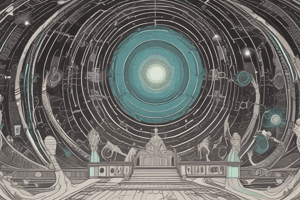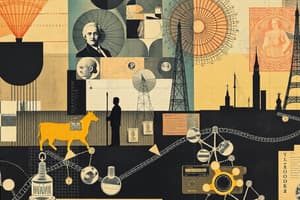Podcast
Questions and Answers
Why is critical thinking important in science?
Why is critical thinking important in science?
- It ensures that scientific knowledge is based solely on data.
- It helps challenge subjective intuitions that may arise. (correct)
- It eliminates the need for creativity in scientific endeavors.
- It guarantees the absolute truth of scientific findings.
What distinguishes scientific knowledge from artistic expression?
What distinguishes scientific knowledge from artistic expression?
- Art aims for reliable and testable knowledge, while science focuses on emotional impact.
- Science relies on subjective interpretation, while art seeks objective truth.
- Art is crucial for entrepreneurs and citizens, while science is limited to academic pursuits.
- Science seeks reliable, testable, evidence-based knowledge, while art prioritizes subjective expression. (correct)
Which of the following is NOT a requirement for knowledge?
Which of the following is NOT a requirement for knowledge?
- Belief in the proposition.
- Widespread acceptance. (correct)
- Justification with adequate evidence.
- Truth, verified through skepticism.
Why is recognizing what we don't know important in the pursuit of knowledge?
Why is recognizing what we don't know important in the pursuit of knowledge?
Which of the following statements best describes the role of skepticism in achieving truth?
Which of the following statements best describes the role of skepticism in achieving truth?
What is the primary focus of the scientific method according to the defining characteristics?
What is the primary focus of the scientific method according to the defining characteristics?
Why is evidentialism crucial to the scientific method?
Why is evidentialism crucial to the scientific method?
For a claim to be considered scientific, which of the following characteristics must it possess?
For a claim to be considered scientific, which of the following characteristics must it possess?
How does social and institutional accountability contribute to the trustworthiness of scientific knowledge?
How does social and institutional accountability contribute to the trustworthiness of scientific knowledge?
What is a key characteristic of pseudoscience?
What is a key characteristic of pseudoscience?
How does cherry-picking data undermine the integrity of a scientific investigation?
How does cherry-picking data undermine the integrity of a scientific investigation?
Which of the following is a characteristic of genuine science?
Which of the following is a characteristic of genuine science?
What is the primary goal of applied research?
What is the primary goal of applied research?
How does science differ from literature, religion, or art?
How does science differ from literature, religion, or art?
Which aspect is essential when defining science by its method?
Which aspect is essential when defining science by its method?
What is the significance of falsifiability, according to Popper, in defining science?
What is the significance of falsifiability, according to Popper, in defining science?
What are the key criteria for recognizing genuine expertise?
What are the key criteria for recognizing genuine expertise?
What is the explanation of 'Knowledge'?
What is the explanation of 'Knowledge'?
What is the 'Vienna Circle’s' view on evidence?
What is the 'Vienna Circle’s' view on evidence?
According to Karl Popper, what should scientists aim to do with evidence?
According to Karl Popper, what should scientists aim to do with evidence?
According to Popper, what is 'corroboration'?
According to Popper, what is 'corroboration'?
Under what circumstance would Popper consider a theory to be more reliable?
Under what circumstance would Popper consider a theory to be more reliable?
What is the primary difference between Verification and Corroboration?
What is the primary difference between Verification and Corroboration?
What does the problem of 'auxiliary hypotheses' say about limits & problems in scientific testing?
What does the problem of 'auxiliary hypotheses' say about limits & problems in scientific testing?
What is the problem of 'underdetermination'?
What is the problem of 'underdetermination'?
How does the 'paradox of confirmation' criticize verification?
How does the 'paradox of confirmation' criticize verification?
To achieve the right results of progress in scientific reliability & progress (According to Falsificationism), what must happen?
To achieve the right results of progress in scientific reliability & progress (According to Falsificationism), what must happen?
According to Popper on pseudoscience, what is the key insight?
According to Popper on pseudoscience, what is the key insight?
Inductive arguments has what feature of truth?
Inductive arguments has what feature of truth?
According to the 'problem of induction' what is the issue?
According to the 'problem of induction' what is the issue?
Flashcards
Science Aims
Science Aims
Science seeks trustworthy knowledge that is reliable, testable, and evidence-based.
Requirements for Knowledge
Requirements for Knowledge
You must believe something, have justification for believing it, and it must be true.
Naturalism
Naturalism
Investigates natural phenomena through empirical means, avoiding supernatural explanations.
Evidentialism
Evidentialism
Signup and view all the flashcards
Openness to Falsification
Openness to Falsification
Signup and view all the flashcards
Social Accountability
Social Accountability
Signup and view all the flashcards
Pseudoscience Traits
Pseudoscience Traits
Signup and view all the flashcards
Science Traits
Science Traits
Signup and view all the flashcards
Basic Research
Basic Research
Signup and view all the flashcards
Applied Research
Applied Research
Signup and view all the flashcards
Science by Subject Matter
Science by Subject Matter
Signup and view all the flashcards
Science by Method
Science by Method
Signup and view all the flashcards
Illusion of Understanding
Illusion of Understanding
Signup and view all the flashcards
Domain-Specific Expertise
Domain-Specific Expertise
Signup and view all the flashcards
Universal Claims
Universal Claims
Signup and view all the flashcards
Verification and Confirmation
Verification and Confirmation
Signup and view all the flashcards
Falsification
Falsification
Signup and view all the flashcards
Empiricism
Empiricism
Signup and view all the flashcards
Good Science
Good Science
Signup and view all the flashcards
Risky Hypotheses
Risky Hypotheses
Signup and view all the flashcards
Valid Basis for Science
Valid Basis for Science
Signup and view all the flashcards
Positivism
Positivism
Signup and view all the flashcards
Falsification
Falsification
Signup and view all the flashcards
Corroboration
Corroboration
Signup and view all the flashcards
Verification
Verification
Signup and view all the flashcards
Underdetermination
Underdetermination
Signup and view all the flashcards
Scientific Objectivity
Scientific Objectivity
Signup and view all the flashcards
Theory-Ladenness of Observation
Theory-Ladenness of Observation
Signup and view all the flashcards
Tentatively Reliable
Tentatively Reliable
Signup and view all the flashcards
Study Notes
- Study notes for the provided text are below:
Why Philosophy of Science?
- Critically evaluates knowledge, data, evidence, and truth
- Critical thinking helps question science's subjectivity
- Unlike art, science aims for reliable, testable, evidence-based knowledge
- Helps distinguish reliable information from misleading claims for entrepreneurs and citizens
Scientific Knowledge
- Belief: acceptance as true
- Justification: good reasons or evidence
- Truth: belief being true and verified
- Needs proper research and recognition of what is unknown
- Requires skepticism and self-revision for true beliefs
Defining Science: Key Characteristics
- Naturalism investigates natural phenomena using empirical methods, avoiding supernatural causes
Evidentialism
- Beliefs must be based on evidence from ongoing, critical investigation
- Evidence must be replicable and reviewed
Falsification
- Scientific claims must be testable and falsifiable, with a willingness to abandon claims proven wrong
Accountability
- Science is a social process involving peer review, collaboration, and competition, where scientists hold each other accountable
Pseudoscience
- Pretends to be science but lacks legitimacy
- Uses cherry-picked or non-transparent data and studies non-natural phenomena
- Claims are non-falsifiable, meaning they cant be proven wrong
Science
- Provides natural explanations for phenomena, based on empirical evidence and involves scientific communities
- Open to revision/falsification, using mathematical tools when appropriate
Importance of Science
- It satisfies practical goals like medicine, innovation, and energy
- Seeks pure knowledge through basic research
- Applied research aims to solve real-world problems, often profit-driven
- Basic and applied research work synergistically
- Science is distinct from literature, religion, or art and aims to solve real-world problems
- Google creates surface-level knowledge, and cause the illusion of understanding
Defining Science in 3 Ways
- History traces science back to the Scientific Revolution (1550–1700) and the Islamic Golden Age, noting blurry origins overlapping with religion/philosophy
- Studies natural phenomena through regular, observable processes that must be detectable with senses or tools
- Natural explanations that don't assume supernatural causes like methodological and ontological naturalism
- Uses empirical investigation, evidentialism, quantitative and qualitative methods
- Must be falsifiable and built on social and institutional collaboration
Climate Change
- Scientists know humans are altering the climate from temperature records, ice cores, and ocean patterns
- Climate models show human impact, expertise requires input from multiple scientific disciplines
- Public concern lags behind research due to misinformation, complexity of evidence, gradual impact, and illusion of understanding
Expertise
- Not all scientists can speak on all topics
- It is domain-specific, and genuine expertise involves credentials, peer recognition, and field relevance
Recognizing Experts
- Look for degrees & affiliations, peer-reviewed publications, consensus within the expert community, and support from other recognized experts
Knowledge
- Defined as justified, true belief.
Basic Research
- Seeks knowledge for its own sake
Applied Research
- Uses science to solve real-world problems
Naturalism
- Focuses on natural observable phenomena
Evidentialism
- Beliefs supported by ongoing evidence
Falsifiability
- A claim must be testable and disprovable
Pseudoscience
- Imitates science by lacks legitimacy/falsifiability
Evidence & Hypothesis Testing
- Scientific knowledge aims for universal claims
- Experience is limited, leading to testing problems
Roles of Evidence
- Verification & Confirmation supports or confirms a hypothesis based on positive results
- Falsification disproves a hypothesis with a single counter-instance
Empiricism
- All scientific beliefs are justified by experience, observation, experimentation, and data
- Justifies confirmation and falsification
Structuring Hypotheses for Falsifiability
- Should be framed to be proven wrong
- Good science attempts to disprove theories
Risky Hypotheses
- Easier to falsify, improving science
- Survival strengthens, not proves, theories
Vienna Circle - Confirmation
- Key Members: Carnap, Hempel, Neurath, Hahn, Gödel
Key Ideas
- Empirical experience is the only valid basis for science
- Knowledge is legitimate if empirically verified Science is descriptive, not evaluative, and philosophy should function like logic/math without speculation
Reliability
- Science is reliable because of its empirical base, which allows testing and observation
- Limits are synonymous with the limits of what can be verified
Counting Evidence
- Evidence needs public, structured, observable, repeatable, and intersubjective elements
Challenges in Verification
- Hypotheses rely on other assumptions (instruments, conditions, prior data)
- Can't isolate a single claim in testing; evidence doesn't confirm in isolation
Paradox of Confirmation
- What counts as real confirmation, logically yes, but is intuitively wrong
Problem of Induction
- We can't observe every case
- Limited experience prevents conclusively verified claims
- Example: the discovery of a black swan in Australia
Popper - Falsification
- Verification is flawed, emphasizing disproving
- Claims it has clear criteria to separate science from pseudoscience
- Defines corroboration as a theory the has repeatedly survived falsification attempts and defines that it isn't correct, just not yet falsified and improves the more risky and tested it gets
Verification vs. Corroboration
- Verification looks for repeated confirmation vs. corroboration seeks disconfirmation testing bold testing
- Verification tries to prove claims right vs. corroboration tries to falsify claims
- Verification sees Positive evidence = confirmation & believes evidence confirms truth vs. corroboration sees Surviving negative evidence = strength & evidence can only refute but not confirm
Auxiliary Hypotheses
- No theory is tested alone, it always includes assumptions
- Disproof may reflect error and may reflect error in any part of the system
Underdetermination
- Empirical evidence might equally support multiple theories
- Shows that evidence alone can’t always pick the "true" theory and questions the objectivity
Intuition
- Confirms intuition is not equal to logic
Hypothesis
- Tested in groups
Theories
- Not always equivalent in terminology
Empiricism
- Cannot always determine the truth
Knowledge
- Comes from experience/observation
Verification
- Supporting hypotheses through positive results
Falsification
- Disproving hypotheses through counterexamples
Risky Hypotheses
- Bold and easily falsified
Auxiliary Assumptions
- Needed for testing
Corroboration
- Hypothesis survives multiple falsifications
Underdetermination
- Multiple theories explain evidence
Positivism
- Knowledge must be verified
Confirmation
- Has a logical mismatch and an intuitive judgement
Goal & Result
- Confirm & verify hypotheses by gathering evidence
- To disprove models by finding exceptions
Empiricism Based
- Grounded in experience and uses objective experiments
Key Problems
- No general claims can be made from a limited experiences and must rely of falsification to find and test disproving claims
Scientific Testing
- It is more useful in industrial and early-stage environments and should challenge assumptions
Popper Pseudoscience
- Avoids verification but can only claim to be falsifiable
Data Design
- Testing experiments and data can confirm falsification
Exam
- Recognize that support claims and theories aren't always equal
Big Question
- How can we trust scientific knowledge that we can't prove
Limited
- Data that uses conclusions does not fully preserve the truth and use probability
Scientific Reasoning
- Is not fully certain and relies on induction
Scientific Claims
- Degrees of testing and not always based on evidence
Belief Strength
- Is due to disagreements during testing
Bayes Theorem
- Supports a solution to the hypothesis
Term Meaning
- Claims that induction is never certain
Subjectivity
- Has benefits but priors can be based on past events
Testing Structure
- Theory is only true if they can be observed
Uniformity
- Past future events is not conclusive
Studying That Suits You
Use AI to generate personalized quizzes and flashcards to suit your learning preferences.




